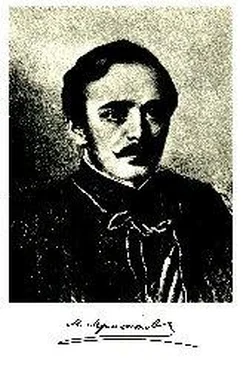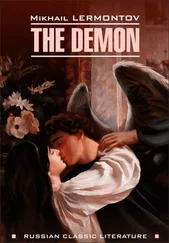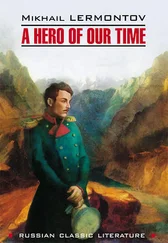"You saw us," she replied, "and you will tell on us." With a superhuman effort she forced me against the gunwale until we both hung perilously over the water and her hair dipped into it. The moment was decisive. I braced my knee against the side of the boat and held her by the hair with one hand and the throat with the other. She let go of my clothes and in a flash I had hurled her into the sea.
It was already quite dark and after seeing her head bob up a couple of times in the foam I lost sight of her completely.
I found a piece of an old oar at the bottom of the boat, and after a great deal of effort managed to reach the landing. As I was making my way along the shore back to the hut, my eyes turned involuntarily toward the spot where the blind boy had waited for the nocturnal boatman the night before. The moon was coming up and in its light I thought I saw someone with white clothes sitting on the shore. Spurred on by curiosity I crept towards it and lay down in the grass on top of a hill rising from the shore. By raising my head slightly I could observe everything that happened below, and I was neither too surprised nor too sorry to find my mermaid there. She was wringing the sea water from her long hair, and I noticed how her wet shift outlined her lithe form and raised breasts. Soon a boat appeared in the distance and quickly approached the shore. Like the night before, a man stepped out of it wearing a Tatar cap, though his hair was cut in Cossack fashion, and he had a large knife stuck under his belt. "Yanko," she said, "everything is lost!" They continued talking, but in so low a voice that I could not hear a word. "And where is the blind one?" Yanko finally asked in a louder tone. "I sent him for something," was the reply. A few minutes later the blind boy appeared carrying a bag on his back. This was put into the boat.
"Listen, blind one," said Yanko, "take care of that spot, you know what I mean? There's a wealth of goods there... And tell (the name I could not make out) that I am no longer his servant. Things have turned out badly and he'll see me no more. It's dangerous to go on. I'm going to look for work elsewhere; he won't find another daredevil like me. And tell him that had he paid more generously, Yanko wouldn't have left him. I can always make my way wherever the wind blows and the sea roars!" After a brief pause, Yanko continued: "I'll take her with me, for she can't stay behind, and tell the old woman it's time she died. She's lived long enough and ought to know when her time's up. She'll never see us again."
"What about me?" the blind boy whimpered.
"What do I need you for?" was the answer.
In the meantime my mermaid had jumped into the boat and was making signs to the other to come. Yanko put something into the blind boy's hand and muttered: "Here, buy yourself some ginger cakes." "Is that all?" asked the blind one. "All right, take this too." The coin rang as it fell on the stones. The blind boy didn't pick it up. Yanko got into the boat, and as the wind was blowing out to sea, they raised a small sail and quickly slipped into the distance. For a long time the white sail flashed among the dark waves in the moonlight. The blind boy remained sitting on the shore, and I heard something that sounded like sobbing: it was the blind boy crying, and he cried for a long, long time... A sadness came over me. Why did fate have to throw me into the peaceful lives of honest smugglers? Like a stone hurled into the placid surface of a pond I had disturbed their tranquillity, and like a stone had nearly gone to the bottom myself!
I returned to where I was staying. In the hall a candle spluttered its last on a wooden platter, while my Cossack, orders notwithstanding, was fast asleep, gripping a gun with both hands. I didn't disturb him, and picking up the candle went into the room. But alas, my box, my silver-inlaid saber and a Daghestan dagger that I'd received as a present from a friend had all disappeared. Now I guessed what the confounded blind boy had been carrying. Waking up the Cossack with little ceremony, I swore at him and vented my anger, but there was nothing that could be done about it any more. And wouldn't it have been idiotic for me to complain to my superiors that I'd been robbed by a blind boy and that an eighteen-year-old girl had all but drowned me?
Thank God an opportunity offered itself the following morning to travel on, and I left Taman. What became of the old woman and the poor blind boy, I don't know. And, after all, what have human joys and sorrows to do with me, an officer who travels around on official business!
Part II.
Conclusion of Pechorin's Journal
Yesterday I arrived in Pyatigorsk [80] spa town on river about 60 miles west of Yekateringrad and north of the Caucasus and its highest peak, Mt. Elbrus. Lermontov was killed in a duel here. A spa is a place with mineral water springs thought to have healing properties and thus frequented by wounded soldiers or other sick or old people. It was a good place to mix and form new social relationships and so a suitable place for a novel. Finally, this type of society gathering was usual in the society novels that Lermontov effectively puts paid to in this segment (the Encyclopædia Brittanica article on Lermontov seems to miss the point of its irony entirely).
and rented quarters in the outskirts at the foot of Mount Mashuk; this is the highest part of the town, so high that the clouds will reach down to my roof during thunderstorms. When I opened the window at five o'clock this morning the fragrance of the flowers growing in the modest little front garden flooded my room. The flower-laden branches of the cherry trees peep into my windows, and now and then the wind sprinkles my writing desk with the white petals. I have a marvelous view on three sides. Five-peaked Beshtau looms blue in the west like "the last cloud [81] "the last cloud...": from Pushkin's The Storm Cloud, 1835.
of the storm blown over." In the north rises Mashuk like a shaggy Persian cap, concealing this part of the horizon. To the east the view is more cheerful: down below, the clean new town spreads colorfully before me, the medicinal fountains babble, and so do the multilingual crowds. Further in the distance the massive amphitheater of mountains grows ever bluer and mistier, while on the fringe of the horizon stretches the silvery chain of snow-capped peaks beginning with Kazbek and ending with twin-peaked Elbrus... It is a joy to live in a place like this! A feeling of elation flows in all my veins. The air is pure and fresh like the kiss of a child, the sun is bright and the sky blue-what more could one desire? What place is there here for passions, yearnings and regrets? But it's time to go. I'll walk down to Elizabeth Spring, where they say the spa society congregates in the mornings.
[82] swelling of the glands.
On reaching the center of the town I took the boulevard, where I encountered several melancholy groups slowly climbing the hill. That most of them were land-owning families from the steppes [65] the dry steppes, or rolling upland prairie hills north of the Caucasus, were crossed by (Bactrian) camel caravans.
was obvious from the worn, old-fashioned coats of the men and the dainty dress of the wives and daughters. They evidently had all the eligible young men at the spa marked out, for they looked at me with fond curiosity. The Petersburg cut of my coat deceived them at first, but in discovering my army epaulets [14] epaulets or epaulettes , fancy shoulder boards with fringes hanging from the ends showing an officer's rank. Although mostly generals or admirals wear them now for fancy dress, even lowly officers wore them then regularly.
they soon turned away in disgust.
Читать дальше

![Михаил Лермонтов - A Hero of Our Time [New Translation]](/books/27671/mihail-lermontov-a-hero-of-our-time-new-translati-thumb.webp)










